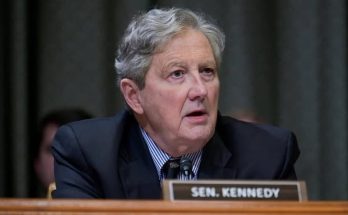John Kennedy’s Unfiltered Take on Senator Spy Sc4ndal Has Everyone Laughing — Even Pam Bondi Can’t Contain Herself?

In a riveting and deeply unsettling congressional hearing, Senator John Kennedy of Louisiana brought Washington to a standstill as he meticulously dissected two explosive issues that strike at the very heart of American justice and privacy. With his signature blend of sharp wit and relentless questioning, Kennedy grilled top officials, exposing shocking new details about the Jeffrey Epstein scandal and a covert operation that involved obtaining the private phone records of eight sitting United States senators. The revelations have sent shockwaves through the political landscape, raising profound questions about power, corruption, and the rule of law.
The hearing took a dramatic turn when Senator Kennedy shifted his focus to an interview given by Howard Lutnick, the CEO of Cantor Fitzgerald, who was a next-door neighbor to the infamous financier Jeffrey Epstein. Kennedy, holding a transcript of the interview, quoted Lutnick’s bone-chilling description of Epstein as “the greatest blackmailer ever.” According to Lutnick, Epstein’s vast wealth and influence were not the product of legitimate business but of a sinister, systematic blackmail operation. He claimed that Epstein’s modus operandi was to lure powerful men into compromising situations, often under the guise of a massage, where they would be secretly videotaped.
“That’s what his M.O. was,” Kennedy read from Lutnick’s statement. “Get a massage, get a massage. And what happened in that massage room, I assume, was a video. This guy was the greatest blackmailer ever. That’s how he had money.”
The most damning part of Lutnick’s testimony, as highlighted by Kennedy, was the assertion that these prominent men were not unwitting victims who simply ignored red flags. When asked if they saw Epstein’s perverse nature and turned a blind eye, Lutnick’s response was blunt: “No, they participated.” This explosive claim suggests a level of complicity that goes far beyond what has been publicly understood, painting a grim picture of an elite network bound by shared secrets and illicit activities.
Senator Kennedy pressed the witness, who appeared to be a high-ranking official from the Department of Justice or FBI, on whether they had interviewed Lutnick following these public allegations. The official admitted they had not, prompting a pointed suggestion from Kennedy that they “ought to get Mr. Lutnick in here.” The exchange underscored a frustrating lack of urgency from law enforcement in pursuing what could be a treasure trove of information from a credible, high-profile witness. The question now hangs heavy in the air: why hasn’t one of the most crucial potential witnesses in the Epstein saga been formally interviewed?
As if the Epstein revelations weren’t enough, Senator Kennedy dedicated a significant portion of his time to another equally alarming issue: the surveillance of his own colleagues. He constructed a detailed hypothetical scenario to illustrate the egregious breach of privacy and legal process involved in a special counsel obtaining the phone records of a sitting United States senator from a telecommunications giant like AT&T.
With methodical precision, Kennedy walked the witness through the legal safeguards that should prevent such an intrusion. He established that acquiring these records would require, at a minimum, a subpoena backed by probable cause to believe the senator was involved in a criminal conspiracy. Furthermore, a judge would have to sign off on it. Kennedy repeatedly emphasized the gravity of the target: “Did I mention it was a sitting United States senator?” he asked sarcastically, driving home the point that this was no ordinary investigation.
The Senator then turned his fire towards the telecommunication companies themselves. He argued that any competent general counsel, upon receiving such a subpoena, would not simply comply. They would have the right, and arguably the duty, to file a motion to quash it, or at the very least, to notify the senator in question. To just hand over the records of an elected official without a fight, Kennedy suggested, was a shocking dereliction of responsibility that could expose them to massive civil liability.
“Maybe they should have gone to Amazon and buy some testicles online,” Kennedy quipped, his folksy humor cutting through the dense legal jargon to deliver a sharp rebuke of what he perceived as corporate cowardice. He painted a picture of a system where powerful entities, both in government and the private sector, failed to uphold their obligations, leading to a flagrant violation of privacy.

The climax of this line of questioning came when it was confirmed that this was not a hypothetical. The phone records of eight sitting U.S. senators had indeed been acquired. The official present could not, or would not, discuss the details, citing a pending investigation. This stonewalling only deepened the sense of outrage. Kennedy voiced his concern that the entire affair would be “swept under the rug,” warning the official that they would face immense pressure “from all quarters.”
The hearing, masterfully orchestrated by Senator Kennedy, left the public with two deeply disturbing takeaways. First, the Epstein case is far from closed, with credible allegations of a widespread blackmail ring implicating powerful individuals who have yet to be held accountable. Second, the mechanisms of justice and oversight appear to have been compromised, allowing for unprecedented surveillance of the nation’s own lawmakers.
These are not separate issues but two sides of the same coin, revealing a potential rot at the core of our institutions. They speak to a world where the powerful operate by a different set of rules, where secrets are currency, and where privacy is a privilege, not a right. As the dust settles, the American people are left to wonder who is watching the watchers, and whether the promise of equal justice for all is still a reality. Senator Kennedy’s relentless pursuit of the truth has opened a Pandora’s box, and the consequences are only just beginning to unfold.



